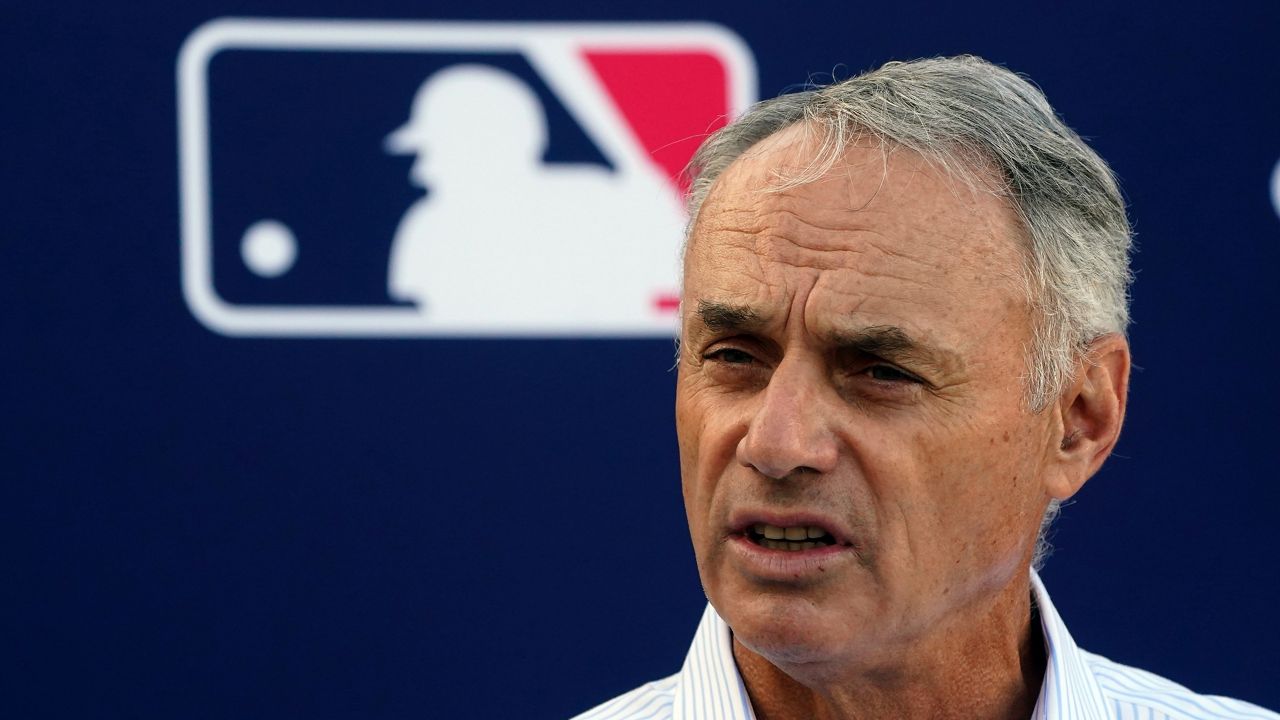Major League Baseball announced Tuesday that, owing to the club owners’ ongoing lockout of players, that the start of the regular season — including Opening Day as well as each teams’ first two series of games — has been canceled, opting instead to delay the start of the 2022 regular season.
In simplest terms, the owners have decided that they aren’t going to let the players come back to work until the two sides have signed onto a new collective bargaining agreement between the players’ union and the league.
More broadly, it means no games, no spring training, no use of team facilities, and that the league’s many taxpayer-funded stadiums will sit empty until a new deal is struck.
That also means that anything MLB licenses from the players’ union — including player headshots and likenesses — isn’t being used by MLB or its teams. As a result, the league’s own websites look like relative ghost towns; team news stories are populated with stock images, while team roster pages are simply lists of names next to generic player silhouettes, like row after row of new Twitter profiles.
It’s the league’s first work stoppage to cancel games since the 1994 player strike.
“In terms of the substance of where the owners and the players are disagreeing, this is historically not the biggest chasm the two sides have ever faced,” said JP Hoongstra, MLB writer for Southern California News Group. The key, he said, is dollars and cents — players are looking to ensure that the lowest paid players, earning league minimum salaries, aren’t having their earnings outpaced by inflation.
And though MLB Commissioner Rob Manfred took great pains to lay blame for the work stoppage at the players’ feet, observers like Hoongstra found that the owners have been responsible for most of the stalls in these talks, up to and including the “artificial deadline” for canceling games.
According to reports late last year, before the lockout itself began, the great gem for league owners in CBA negotiations was an expanded postseason of up to 14 teams. Such an expansion would lead to more postseason games, which would be a boon on top of the already grandiose broadcasting agreements the league scores for its playoff rights. According to Baseball Prospectus, every one of MLB’s 30 teams is expected to make $60.1 million via national TV deals starting with the 2022 season.
The players, meanwhile, were interested in preventing the implementation of a salary cap, instead seeking to raise the ceiling on payroll luxury taxes; in eliminating "tanking "— intentionally losing games for a better draft position — for higher picks in upcoming amateur player drafts; and ensuring that young players have more control over their contract terms by allowing for contract arbitration for players with fewer than three years of MLB play.
As the team owner-imposed Feb. 28 deadline for regular season cancellations neared, the league and the players intensified in their talks, with so much headway made that the league extended its deadline to March 1, at 5 p.m.
On Tuesday, the league made its “best” offer, which according to Yahoo baseball writer Hannah Keyser includes a $30 million bonus pool for high-performing young players; minimum player salaries starting at $700,000; a 12 team postseason; a draft lottery for the top five picks; and competitive balance tax thresholds — a luxury tax for teams with the highest payrolls — lower than those sought by the players.
According to multiple reports aggregated by MLBTradeRumors.com, the players sought minimum pay starting at $725,000; an $85 million bonus pool; a draft lottery for the top seven picks; and adjustments that would allow high-performing players to reach free agency faster. The players also sought the competitive balance tax to be raised to $238 million in 2022 — $18 million more than the league offered.
(For context, only three teams surpassed the $210 million luxury tax in 2021: the Los Angeles Dodgers, the Philadelphia Phillies, and the Boston Red Sox. Of those teams, only last year’s Dodgers payroll would have exceeded the $238 million player-proposed luxury tax.)
At 1:18, ESPN’s Jeff Passan reported that MLBPA leaders agreed unanimously to not accept MLB’s final proposal.
In the national media discussion, opinions have gone back and forth as to whether or not the owners have made meaningful concessions over the most recent round of negotiations.
“I think you’re giving them too much credit,” said Bill Plunkett, Dodgers beat writer for the Orange County Register. “I don’t think [the owners] have given up on anything they care about. They’ve moved a bit on salary, moved a bit on the pre-arbitration pool.”
But largely? The owners aren’t worried about losing games early in the season, so long as they can get a deal that’s favorable to them. The big money, Plunkett noted, is made later in the season.
“Playoff revenue, TV revenue, is shared equally. You don’t have to make the playoffs to make the money, so that works against what the players are looking for,” Plunkett said. “If you follow some of the players on social, they hate the idea of a 14 team playoff.”
“If it was solely within my ability, or the ability of the clubs to get an agreement, we’d have an agreement,” MLB Commissioner Rob Manfred told the press on Tuesday, after the league-imposed deadline passed. “The tough thing about this process is it takes both sides to make an agreement.”
MLBPA executive director Tony Clark called the cancellation a "sad day," saying that the players sought "fundamental fairness."
"Despite meeting daily, there is still significant work to be done.” Clark said. “The reason we are not playing is simple: a lockout is the ultimate economic weapon.”



